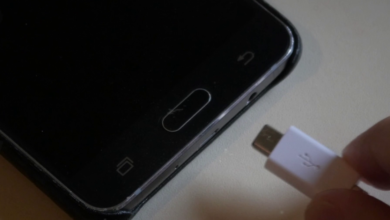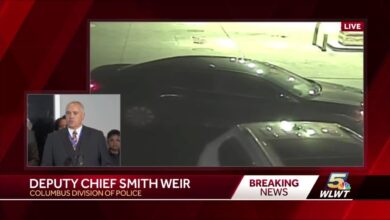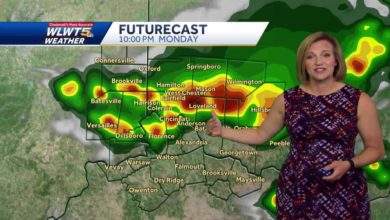

A former U.S. attorney talked with WLWT about the riot at the U.S. Capitol exactly one week ago, and the process of identifying and prosecuting those who took part.Former U.S. Attorney Ben Glassman described the investigation into the Capitol riot as a monumental undertaking.He said the event was domestic terrorism and it is something the nation needs to confront now."This is not a new threat. This is a threat that has existed for quite a few years but has clearly been growing over the last several years and now appears to have hit a crescendo," Glassman said.He spent 15 years as a federal prosecutor and four years as the U.S. attorney for the Southern District of Ohio.Glassman also investigated and prosecuted domestic terrorism.He called last week's riot just that."I was beyond shocked. I was outraged," he said.Dozens have been charged and the FBI continues to scour a wealth of photos, videos and social media evidence.The agency has opened 170 case files and gotten more than 100,000 pieces of digital media since last week."I've seen many cases in my own experience where a cell phone video that someone took at the time of the crime was the difference between a successful prosecution and no prosecution at all," Glassman said.He said when investigating a case this serious, it is important to make sure it is complete so that all of the participants in any sort of criminal activity are known."Conspiracies are often investigated and then prosecuted by finding out the full scope of who's in the conspiracy and often charging or at least bringing to awareness of charges those people at the lower levels of the conspiracy first," Glassman said.He said those who carry out commands might decide to cooperate with law enforcement once they see what they've done is wrong and consider potential consequences.New tips about potential threats are pouring into law enforcement agencies leading to tighter security at statehouses and in Washington, D.C., ahead of President-elect Joe Biden's inauguration.Glassman said peaceful protests are protected by the First Amendment, but if you are concerned about something you see or hear, tell law enforcement."The First Amendment does not give anyone the license to engage in violent conduct, to destroy property, to try to influence or coerce or intimidate the government. Those are all crimes. They're very serious crimes," Glassman said.There are concerns that some are "going dark" or switching to encrypted messaging systems.Compared to social media, Glassman said that makes it much tougher for law enforcement to identify future threats."There really can be, in my opinion, no higher priority for federal law enforcement than to identify and then, shut down this threat," he said.Glassman said over the years, there have not been many prosecutions for seditious conspiracy or for interstate travel to participate in a riot, but he thinks those will be important tools for federal agents and prosecutors as they move forward in these cases.
A former U.S. attorney talked with WLWT about the riot at the U.S. Capitol exactly one week ago, and the process of identifying and prosecuting those who took part.
Former U.S. Attorney Ben Glassman described the investigation into the Capitol riot as a monumental undertaking.
He said the event was domestic terrorism and it is something the nation needs to confront now.
"This is not a new threat. This is a threat that has existed for quite a few years but has clearly been growing over the last several years and now appears to have hit a crescendo," Glassman said.
He spent 15 years as a federal prosecutor and four years as the U.S. attorney for the Southern District of Ohio.
Glassman also investigated and prosecuted domestic terrorism.
He called last week's riot just that.
"I was beyond shocked. I was outraged," he said.
Dozens have been charged and the FBI continues to scour a wealth of photos, videos and social media evidence.
The agency has opened 170 case files and gotten more than 100,000 pieces of digital media since last week.
"I've seen many cases in my own experience where a cell phone video that someone took at the time of the crime was the difference between a successful prosecution and no prosecution at all," Glassman said.
He said when investigating a case this serious, it is important to make sure it is complete so that all of the participants in any sort of criminal activity are known.
"Conspiracies are often investigated and then prosecuted by finding out the full scope of who's in the conspiracy and often charging or at least bringing to awareness of charges those people at the lower levels of the conspiracy first," Glassman said.
He said those who carry out commands might decide to cooperate with law enforcement once they see what they've done is wrong and consider potential consequences.
New tips about potential threats are pouring into law enforcement agencies leading to tighter security at statehouses and in Washington, D.C., ahead of President-elect Joe Biden's inauguration.
Glassman said peaceful protests are protected by the First Amendment, but if you are concerned about something you see or hear, tell law enforcement.
"The First Amendment does not give anyone the license to engage in violent conduct, to destroy property, to try to influence or coerce or intimidate the government. Those are all crimes. They're very serious crimes," Glassman said.
There are concerns that some are "going dark" or switching to encrypted messaging systems.
Compared to social media, Glassman said that makes it much tougher for law enforcement to identify future threats.
"There really can be, in my opinion, no higher priority for federal law enforcement than to identify and then, shut down this threat," he said.
Glassman said over the years, there have not been many prosecutions for seditious conspiracy or for interstate travel to participate in a riot, but he thinks those will be important tools for federal agents and prosecutors as they move forward in these cases.
Source link









